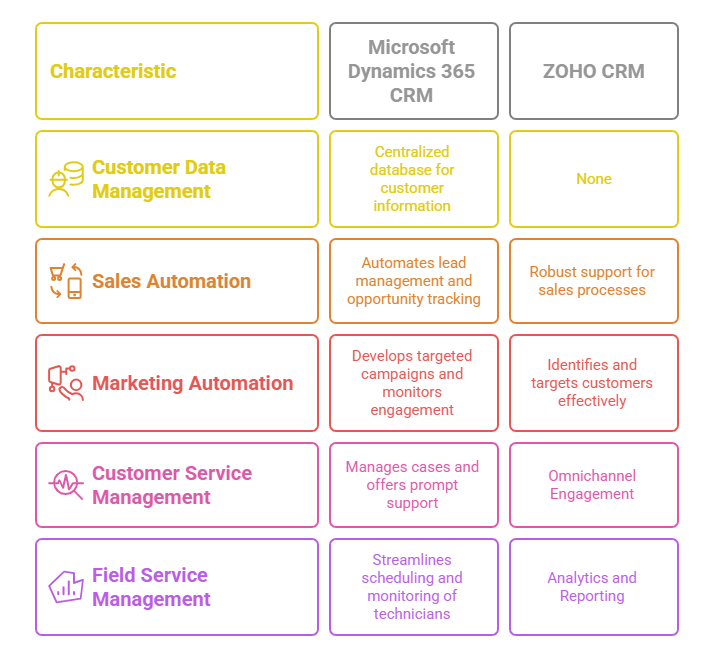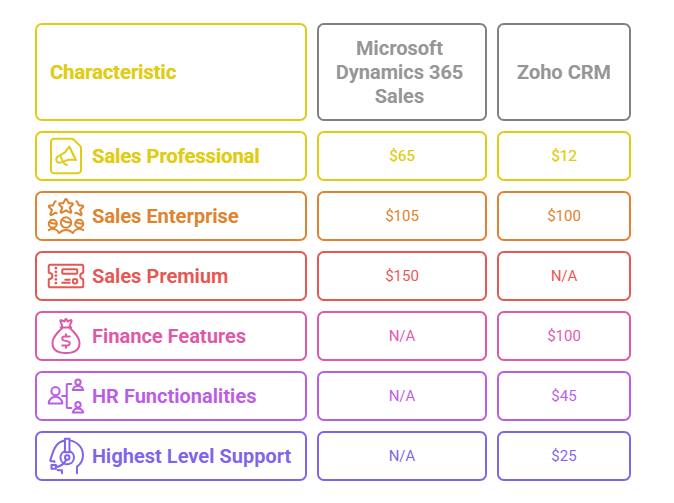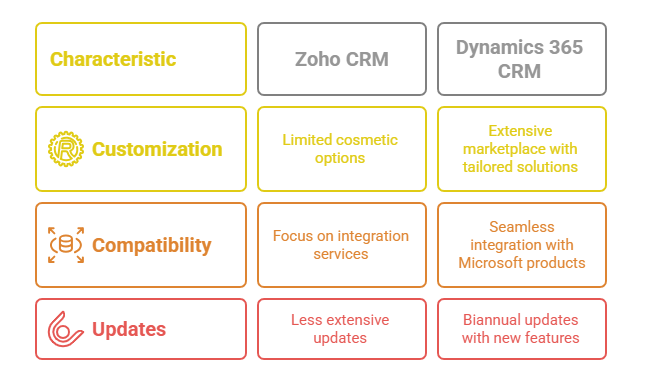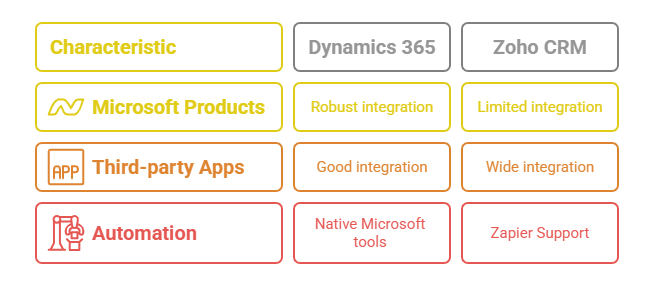If there’s one crucial aspect of business worth investing your time and money in, it’s Customer Relationship Management (CRM). CRM allows your business to connect more efficiently with customers and manage relationships effectively. With numerous CRM software options available today, data-driven solutions have made managing this function easier.
CRM systems help businesses track sales leads, monitor pipelines, manage marketing, and maintain customer relationships. These platforms also simplify administrative tasks, enabling businesses to focus more on customer service. Additionally, many CRMs are cloud-based, allowing for greater collaboration and mobility.
Now, let’s compare two popular CRM solutions, Zoho vs Dynamics 365 by evaluating their features, pricing, and integrations.
What is Microsoft Dynamics 365?
Microsoft Dynamics 365 is a cloud-based enterprise platform that integrates Business Central ERP, Dynamics 365 Sales CRM, and HCM solutions with Power BI reporting into one unified system.
Its modular structure breaks down ERP and CRM functionalities into separate applications, allowing users to begin with essential tools and scale up gradually by adding more apps and features as needed.
Built on Microsoft’s Azure cloud infrastructure, Dynamics 365 services operate as a Software as a Service (SaaS) platform, accessible via a web browser. This setup ensures that updates and fixes are automatically handled by Microsoft, while users can access the platform from any location with an internet connection.
What is Zoho CRM?
As a cloud-based platform, it offers strong capabilities in marketing automation, analytics, and omnichannel customer engagement. Zoho adopts a strategy similar to Microsoft’s by providing a wide range of applications that cover various business functions. However, many of these apps operate on separate data models, which can hinder cross-functional insights and require more effort to integrate.
Although Zoho’s native app ecosystem minimizes reliance on third-party tools, it also limits flexibility, offering fewer pre-built integrations than platforms like Salesforce or HubSpot. This may affect scalability for businesses aiming to use a best-of-breed technology stack.
Features: Zoho vs Dynamics 365 CRM

Features of Dynamics 365 CRM
Dynamics 365 CRM provides a broad set of features that enable businesses to manage customer relationships efficiently, streamline operations, and foster growth. Here are some of the key features of Microsoft Dynamics CRM.
Customer Data Management
Dynamics 365 CRM offers a centralized database for storing and managing customer information, such as contact details, communication history, and preferences. This comprehensive view of customers enhances understanding and allows for more personalized interactions.
Sales Automation
The CRM automates several sales tasks, including lead management, opportunity tracking, and quote generation. It helps sales teams prioritize leads, engage prospects, and close deals more effectively. By streamlining the sales process, it improves sales cycle management and provides valuable insights to the sales team.
Marketing Automation
Microsoft Dynamics 365 CRM empowers marketing teams to develop and implement targeted campaigns, monitor engagement, and evaluate outcomes. Automation simplifies marketing processes, enhances lead generation, and boosts ROI (Return on Investment).
Customer Service Management
The CRM facilitates customer service teams in recording and tracking inquiries, managing cases, and offering prompt support. Its customer service module is tailored to provide personalized services quickly, adding value to every interaction. Customer service representatives can access client histories and preferences to deliver effective support, while AI-driven chatbots and knowledge bases improve self-service options for customers.
Field Service Management
For companies that need on-site service, Dynamics 365 CRM streamlines the scheduling, dispatching, and monitoring of field service technicians, enhancing the efficiency of service delivery.
Features of ZOHO CRM
Zoho CRM’s features are categorized into marketing automation, sales automation, omni-channel engagement, and analytics capabilities, which are explained as follows:
Salesforce Automation
Zoho CRM offers robust support for sales force automation, achieving a weighted support score of 75.89%. This reflects its strong functionality in managing leads, opportunities, forecasts, and other essential sales processes.
However, it falls short of the market average score of 90.74%, indicating that some competitors may provide more comprehensive sales automation solutions. We have complete data on Zoho’s sales capabilities, with no features left unrated.
Marketing Automation
Zoho CRM effectively identifies and targets customers by utilizing customer segmentation, lead nurturing, and event management. Furthermore, it allows for seamless integration with Google Ads, enabling you to assess the effectiveness of your Google Ads investment directly within the platform.
Zoho adopts an integrated approach, linking marketing automation with the wider CRM and sales enablement functions. With its powerful features, Zoho offers advanced marketing tools that are ideal for businesses of all sizes.
Analytics and Reporting
Zoho CRM enables users to gain deeper insights into business performance through dashboards, reports, and charts. By examining key business indicators, organizations can make informed decisions and accurately predict sales. Additionally, customizable analytics tools allow teams to track specific metrics that matter most to their operations, enhancing strategic planning and improving overall performance.
Omnichannel Engagement
Zoho CRM enables you to engage with customers across various channels, including email, phone, live chat, and social media. This allows for real-time interaction with clients, regardless of the platform they choose to connect with your brand. For instance, you can manage email communications and make customer calls directly within the Zoho CRM platform.
Pricing: Zoho vs Dynamics 365 CRM

Pricing of Microsoft Dynamics 365 CRM
Among the various modules offered by Microsoft Dynamics 365, Dynamics 365 Sales stands out as the most popular CRM solution. It’s widely adopted for its robust lead management, sales automation, and seamless integration with Microsoft tools. Businesses across industries rely on it to boost productivity and close deals faster. Here are its pricing details to help you choose the right plan based on your business needs.
Sales Professional: $65
This package provides essential sales features designed for small to medium-sized teams. It includes tools for lead and opportunity management, sales forecasting, and basic reporting.
Sales Enterprise: $105
The Sales Enterprise package builds on the Professional tier by offering advanced sales capabilities, including customizable sales processes, AI-driven insights, and enhanced reporting features.
Sales Premium: $150
The Sales Premium tier includes all the features of the Enterprise package, along with additional tools for sales performance management and advanced analytics.
Each plan is designed to provide businesses with the tools necessary to enhance their sales effectiveness and improve customer relationships, allowing organizations to choose a plan that best fits their size and objectives.
Pricing of Zoho CRM
One of the main attractions of this CRM is its affordability. Zoho is free for companies with fewer than three users. For larger teams, the basic package for sales and marketing starts at approximately $12 per user per month, with prices increasing to $100 per user per month for premium options.
Additionally, organizations can expect to pay around $100 per month for finance features, which cover up to 10 users, with extra users available for a nominal fee. If companies want to utilize Zoho’s HR functionalities, the cost is $45 per user each month.
Finally, the highest level of support is available for $25 per organization monthly, with no obvious initial development costs.
Customization: Zoho vs Dynamics 365 CRM

Customization & Compatibility of Zoho CRM
Zoho CRM provides some customization options, with guidance available on its website for implementation. However, most of these customizations are primarily cosmetic, raising concerns about the platform’s flexibility if it doesn’t meet your needs out of the box. Given the critical role of a CRM in a business, customization is not typically something that non-experts want to handle.
While some companies now offer customization services for Zoho, there appear to be limitations on what can be achieved. Many of these services focus more on integrating with other platforms rather than customizing workflows.
Customization & Compatibility of Dynamics 365 CRM
As a Microsoft product, Dynamics 365 seamlessly integrates with platforms like Outlook, SharePoint, and the Office 365 suite, along with unexpected platforms such as LinkedIn.
Integrating with other tools is generally straightforward. Most marketing automation and accounting platforms can be connected using readily available third-party middleware, and some software even includes built-in integration capabilities, reflecting Dynamics 365’s widespread use.
There is a significantly larger marketplace for Dynamics 365 customization, offering more options for companies. Various providers offer solutions tailored to specific industries or functionalities, while companies like Akita can provide broader development services suitable for diverse sectors.
Moreover, Dynamics 365 benefits from biannual updates that introduce new features and enhancements. While Zoho also provides updates, they are not as extensive.
In the comparison between Dynamics 365 and Zoho, Microsoft clearly leads in customization capabilities, offering a broader range of solutions. The integrations available with Dynamics 365 also enhance business functionality more extensively, while Zoho’s offerings seem to be more limited and less reliable.
Integrations Capabilities: Zoho vs Dynamics 365 CRM

Integrations Capabilities of Dynamics 365 CRM
Integrations are a crucial factor to consider, especially since businesses often rely on various applications to manage their operations. Effective software solutions should facilitate seamless integration with your existing tools, enhancing productivity and streamlining workflows.
Microsoft dynamics 365 offers robust integration capabilities with a range of Microsoft products, including Outlook, OneNote, OneDrive, Yammer, Excel, and SharePoint. This tight integration within the Microsoft ecosystem allows for smooth data flow and collaboration, making it an excellent choice for organizations already using Microsoft services. Additionally, Dynamics 365 supports integration with various third-party applications, ensuring that businesses can tailor their CRM experience to their specific needs.
Integrations Capabilities of Zoho CRM
Zoho CRM integrates with popular applications such as Google Drive, Microsoft Outlook, Google Calendar, QuickBooks, Zapier, MailChimp, DocuSign, FreshBooks, and Gmail. This variety allows businesses to connect Zoho CRM with many essential tools they may already be using. The integration with Zapier enables users to automate workflows and connect Zoho with numerous other apps without the need for coding.
Overall, while both platforms offer valuable integration options, Dynamics 365’s deep connections within the Microsoft ecosystem may provide a more cohesive experience for users heavily invested in Microsoft products.
Final Thought!
Choosing the right CRM solution involves thoughtfully evaluating your business goals, budget constraints, and future scalability needs. If you’re looking for a CRM system that you want to customize extensively to streamline your business processes, Dynamics 365 is a more suitable choice. Also, if you are planning to move from Zoho to Dynamics 365 CRM ,then in both cases it’s worth consulting a Microsoft Dynamics Partner to evaluate your needs and guide you through a tailored Dynamics 365 implementation.
Planning to switch from Zoho to Microsoft Dynamics 365 CRM?












